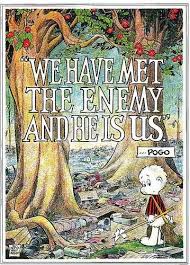

As for the nature of the human heart Jesus Christ taught:
"For from within, out of the heart of man, come evil thoughts, fornication, theft, murder, adultery, coveting, wickedness, deceit, licentiousness, envy, slander, pride, foolishness. All these evil things come from within, and they defile a man." (Mark 7:21-23)
James, the half-brother of Jesus came to know God after the resurrection of Jesus. He went on to become a leader of the early Jewish-Christian church in Jerusalem. His epistle is probably the earliest letter we have in the New Testament. In Chapter Four, James puts his finger squarely on the reason why violence, fighting and wars are in the world:
What causes wars, and what causes fightings among you? Is it not your passions that are at war (stratos) in your members? You desire and do not have; so you kill. And you covet and cannot obtain; so you fight and wage war. You do not have, because you do not ask. You ask and do not receive, because you ask wrongly, to spend it on your passions.
The Greek original is interesting because "wars" (machomai) and "fightings (polemos) in this passage are military terms in the original. They refer to the individual campaigns and skirmishes as well as a war as a totality. "Members" is melos in Greek--from which our English word "melody" is derived! "Passions" (or pleasures), hedone, is the root for our English word "hedonism."

James bluntly states that the pursuit of pleasure, living for self, choosing false gods and the resulting spiritual adultery,is what causes our unfulfilled search for pleasure and happiness to turn into hatred, violence and murder! We were made to find our fulfillment living in union with God.
When we choose other gods instead, we act contrary to the way the universe was made to function--our idolatry leads to emptiness and despair. It can not be otherwise.
Unfaithful creatures! (Greek: adulteresses, feminine, plural)
Do you not know that friendship with the world is enmity with God? Therefore whoever wishes to be a friend of the world makes himself an enemy of God. Or do you suppose it is in vain that the scripture says, "He yearns jealously over the spirit which he has made to dwell in us"? But he gives more grace; therefore it says, "God opposes the proud, but gives grace to the humble.
Finally James urges us to turn wholeheartedly to God, for therein is our salvation and the means of repairing and restoring a broken social order. Without God's help we as a people have no defense against the forces of darkness which seek to erupt and destroy us all.
Submit yourselves therefore to God. Resist the devil and he will flee from you. Draw near to God and he will draw near to you. Cleanse your hands, you sinners, and purify your hearts, you men of double mind. Be wretched and mourn and weep. Let your laughter be turned to mourning and your joy to dejection. Humble yourselves before the Lord and he will exalt you. (James 4:1-10)

![]()

Unprecedented prosperity, low unemployment, and a buoyant optimism characterized the spring of 1999 in America. A vague uneasiness crept in when the evening news described the NATO bombings and terrible refugee situation in the Balkans. And then terrible news from Littleton, Colorado breaks in upon us. Two ordinary high school juniors had suddenly decided to end their lives by taking a great number of their fellow students with them into eternity. They have chosen a shooting and bombing spree of horrific proportions as their way of expressing their existential despair. Neither is this an isolated episode, for school violence made the major head lines 8 or 9 times in the past couple of years.
It is an illusion to suppose that society is improving morally and sociologically. Economic and technological "advances" do not affect the basic character of human beings. Education does not alter the root conditions of the evil latent in all of us. Psychology can not find a cure. Federal funding, determined resolve by Law Enforcement agencies, and lobbying for better security do not touch the problem.
The Bible does have plenty to say about the matter. It is the absence of God from public life that has caused the forces of violence and darkness to rise to the surface and express themselves in these shocking and hideous forms. Long ago, the prophet Jeremiah described ignoring God versus trusting Him as the difference between living under a curse, or enjoying the favor and blessing of God.
Thus says the LORD: "Cursed is the man who trusts in man and makes flesh his arm, whose heart turns away from the LORD. He is like a shrub in the desert, and shall not see any good come. He shall dwell in the parched places of the wilderness, in an uninhabited salt land. "Blessed is the man who trusts in the LORD, whose trust is the LORD. He is like a tree planted by water, that sends out its roots by the stream, and does not fear when heat comes, for its leaves remain green, and is not anxious in the year of drought, for it does not cease to bear fruit. "The heart is deceitful above all things, and desperately corrupt; who can understand it? "I the LORD search the mind and try the heart, to give to every man according to his ways, according to the fruit of his doings."(Jeremiah 17:5-10)
In those times of history where God's people walk in humility, godliness, and integrity with their God, the society in which these believers live enjoys a good measure of "salt" and "light." Jesus called His disciples by these adjectives because the presence of God in their lives (a) acts as a preservative against moral decay in society, and (b) because light and understanding about God through Christ's church is the only way we can understand the way things really are in a moral universe.
The Apostle Paul indicts the human race for its multiple failures in the first three chapters of his letter to the Romans. The Epistle to the Romans is foundational truth about God--it is must reading for all who want to know and understand their Creator.
Paul begins by telling us that the announcement of the good news of God's love for us in Christ carries with it God's power to change the human heart:
For I am not ashamed of the gospel: it is the power of God for salvation to every one who has faith, to the Jew first and also to the Greek. For in it the righteousness of God is revealed through faith for faith; as it is written, "He who through faith is righteous shall live."
Paul then reveals that mankind is alienated against God and that we are by nature enemies of God and opposed to Him in the way we live--in our motives, goals in life, and presuppositions about most everything. As a result we live out our days under God's abiding "wrath" (Greek: orge).
|
|
![]()

It is when we grant Jesus Christ permission to take over as Lord of our lives that this divine wrath which "rests on us" is removed:
For God so loved the world that he gave his only Son, that whoever believes in him should not perish but have eternal life. For God sent the Son into the world, not to condemn the world, but that the world might be saved through him. He who believes in him is not condemned; he who does not believe is condemned already, because he has not believed in the name of the only Son of God. And this is the judgment, that the light has come into the world, and men loved darkness rather than light, because their deeds were evil. For every one who does evil hates the light, and does not come to the light, lest his deeds should be exposed. But he who does what is true comes to the light, that it may be clearly seen that his deeds have been wrought in God...
He who comes from above is above all; he who is of the earth belongs to the earth, and of the earth he speaks; he who comes from heaven is above all. He bears witness to what he has seen and heard, yet no one receives his testimony; he who receives his testimony sets his seal to this, that God is true. For he whom God has sent utters the words of God, for it is not by measure that he gives the Spirit; the Father loves the Son, and has given all things into his hand. He who believes in the Son has eternal life; he who does not obey the Son shall not see life, but the wrath of God rests upon him.(John 3:16-21, 31-36)
Entire societies degenerate over time--it is unusual in history for a nation or a dynasty to survey more than a few hundred years. No nation, no government--save the case of Israel (see "Thy Kingdom Come, Thy Will be Done")--has ever been founded on a direct covenant with God. Yet our nation was founded at a time when the godly "remnant" of the pioneers and colonists was much stronger than it is now.
Our nation today has a very large professing Christian population--but the "remnant" (i.e., the embedded minority of true believers), is small and weak.
The Apostle Paul tells us that the downward decay of any society proceeds step by step. As human beings turn from worshiping and serving the living God, God releases the restraints against the latent evil in the human heart--in three stages:
For the wrath of God is revealed from heaven
against all ungodliness and wickedness of men
who by their wickedness suppress the truth.For what can be known about God is plain to them,
because God has shown it to them.
Ever since the creation of the world his invisible nature, namely, his eternal power and deity, has been clearly perceived in the things that have been made.
So they are without excuse;
for although they knew God they did not honor him as God or give thanks to him, but they became futile in their thinking and their senseless minds were darkened.
Claiming to be wise, they became fools,and exchanged the glory of the immortal God for images resembling mortal man or birds or animals or reptiles.Therefore God gave them up in the lusts of their hearts
to impurity, to the dishonoring of their bodies among themselves
because they exchanged the truth about God for a lie and worshiped and served the creature rather than the Creator, who is blessed for ever! Amen.
For this reason God gave them up
to dishonorable passions.
women exchanged natural for unnatural,
and the men likewise gave up natural relations with women and were consumed with passion for one another, men committing shameless acts with men and receiving in their own persons the due penalty for their error.
And since they did not see fit to acknowledge God, God gave them up
to a base mind and
to improper conduct.They were filled with all manner of wickedness, evil, covetousness, malice. Full of envy, murder, strife, deceit, malignity, they are gossips,slanderers, haters of God, insolent, haughty, boastful, inventors of evil, disobedient to parents,foolish, faithless, heartless, ruthless.
Though they know God's decree that those who do such things deserve to die, they not only do them but approve those who practice them. (Romans 1:16-32)
The above indictment is not against an individual, it does not tell us precisely what happens when a given individual turns away from God. Rather, Paul is giving us the big picture--God's view of things as they really are.
Where is our nation to be found these days--as God sees us? Clearly, from Romans Chapter One, we have reached the bottom of Paul's list--we are a nation near the point of total moral collapse. We can expect God's severe judgment on us at any time.
As for the nature of the human heart Jesus taught:
"For from within, out of the heart of man, come evil thoughts, fornication, theft, murder, adultery,coveting, wickedness, deceit, licentiousness, envy, slander, pride, foolishness. All these evil things come from within, and they defile a man."(Mark 7:21-23)
The pursuit of pleasure, living for self- choosing false gods and the resulting spiritual adultery is what causes our unfulfilled search for pleasure and happiness to turn into hatred, violence and murder! We were made to find our fulfillment living in union with God. When we choose other gods instead, we act contrary to the way the universe was made to function--our idolatry leads to emptiness and despair. It can not be otherwise.
Submit yourselves therefore to God. Resist the devil and he will flee from you. Draw near to God and he will draw near to you. Cleanse your hands, you sinners, and purify your hearts, you men of double mind. Be wretched and mourn and weep. Let your laughter be turned to mourning and your joy to dejection. Humble yourselves before the Lord and he will exalt you. (James 4:1-10)
After the First Temple in Jerusalem was dedicated, King Solomon prayed a wonderful prayer on behalf of the nation of Israel. God's response included the following promise. It applies to God's people everywhere today:
"When I shut up the heavens so that there is no rain, or command the locust to devour the land, or send pestilence among my people, if my people who are called by my name humble themselves, and pray and seek my face, and turn from their wicked ways, then I will hear from heaven, and will forgive their sin and heal their land." (2 Chronicles 7:13-14)

I propose to present to you ten propositions that I feel are involved in the facing of the issues we are discussing here. We will particularly explore a proper Christian reaction to the nuclear arms race. I want to specify a bit more narrowly what we're going to be talking about. My plan is not so much to discuss the possibilities of a nuclear clash or even the terrible results that would follow, but to look at the nuclear issue from a Christian point of view. Almost every issue that is discussed openly has a presupposition with which it begins, and our presupposition tonight is that the Bible is the Word of God and that Scripture presents the divine viewpoint of life. We will take that as our basic starting point as we seek to examine this issue and to arrive at a conclusion as to what a Christian ought to do, or could do, about the nuclear arms race.
Let me, then, present these ten propositions to you. I'm going to be referring to several passages of scripture, not in an attempt to exhaustively set forth all the Bible teaches in this regard, for that would be far too exhausting. There's much in the Bible on the subject of nations, international conflicts, wars, God's relationship to them and man's participation in them. There is much more than we have time to explore, but I do offer these, not as proof texts but as examples to show that the Bible does say what I'm seeking to set forth to you. I deplore the practice of proof-texting. It is very easy to fall into a setting forth of a statement or belief and then quoting a few verses to leave the impression that this is what the whole Bible teaches. It may be that the Bible does say what is claimed, but it may not be all the Bible says about the subject. Especially in this area of international conflict it is very important to understand this point.
I've had several friendly clashes with very devout and godly Christians who adopt a pacifist position with regard to war and have pages to texts from Scripture to justify their position. My quarrel with them is that they leave out the very passages which would balance their view. That's the trap that proof-texting allows you to fall into, so I'm trying to avoid that, and yet recognize that I can't cover all that the Bible says about this subject, so please don't read these passages as being efforts to prove anything other than that a certain truth is taught in the Bible. If you can think of other passages that you feel contradict the ones I have chosen, I'll be glad to have them brought up and examined.
Here is my first proposition: War is an inevitable human event in a fallen world. That's really saying that it is naive and ingenuous to think that any efforts of human beings will eliminate war from the earth. Bumper sticker theology often presents simplistic ideas like that. I saw a bumper sticker the other day that said, "Eliminate Hate." Well I'm for that, but how do you do it? True, if we could, it would solve tremendous problems in the world. There is no question about that. But that's the kind of simplistic answer that appeals to a lot of people who don't think very deeply about anything. Some will buy such simplistic statements, and respond by forming a movement and even seek to turn their belief into legislation or other rigid approaches to the problem. Yet, on the face of it, anyone who understands human life at all knows that it is naive to try to eliminate hate---men cannot and will not do such things. I think we have to take that position from the very start with regard to war.
In the Bible (James 4, verses 1 and 2), James says, "From whence come wars and conflicts among you? Do they not arise out of your own passions?" That's a tremendously helpful verse because it bridges an individual's world of his own personal life and the social world, extending even to communities, and beyond, to states and nations in the world. The claim of that verse is simply that conflict and strife with neighbors, friends, relatives or nations arises out of human passions---anger and feelings of attack or injustice. The same forces produce world conflicts as well. Wars and strife between individuals or nations spring from the same source. It always appears to be naive for various groups to suggest that we eliminate strife on the social level when the very people who seek to do so haven't succeeded in eliminating conflicts in their own lives. People who mount protests and demonstrations to eliminate war oftentimes have terrible conflicts in their own homes! They haven't solved the problem there, even. We must recognize the Bible teaches us that war is inevitable because of the presence of a fallen nature within us.
Matthew 24, verse 6 is another verse along this line. Here is Jesus' own prediction. In that great twenty-fourth chapter, uttered while he sat on the Mount of Olives, looking out over the City of Jerusalem on the very night in which he was betrayed, he revealed the course of history until the day when he would return again. It is an amazing passage, one of the most startling predictive passages in the Bible. There Jesus said that in the intervening time (which he saw, I'm sure, to be centuries), there would be wars and rumors of wars, nation rising against nation and kingdom against kingdom. Jesus thus recognized the inevitability of war.
In II Chronicles, the sixteenth chapter, the ninth verse, the prophet Hananiah speaking to King Asa of Israel, tells him that because of his unbelief he would have wars in his kingdom. This verse and other passages link the reactions of individuals to social events and especially social strife.
My second proposition which grows out of the first and relates to it is this: Since war is an inevitable event in a fallen world, in the scriptures it is peace that is regarded as unusual among men and a special gift of God. The Christian view of life is (following the teachings of our Lord, himself) that the world is under satanic control. Jesus called the devil the "prince of this world" and the "god of this world." The apostles reflect that same view. Jesus said the devil was a strong man who guards his house and its goods are helpless to do anything to deliver themselves. This indicates that if it were not for the intervening grace of God, all of life, every moment of it, would be filled with war, struggle, strife, anger and hostility. We'd be at one another's throats all the time. It's God's intervention in a godless world---a wicked world (if you want to use the biblical term) that allows any peace at all. Therefore, peace must always be regarded as a gift of the Spirit of God. We find that directly stated in Psalms 46, verse 9: "He makes wars to cease unto the ends of the earth." It is God who brings wars to an end. Isaiah, chapter 2, verse 4, is that famous passage which states that God will cause men to beat their swords into plowshares and their spears into pruning hooks, and that man shall learn war no more. Peace is a result of the direct activity of the Spirit of God. See also Jeremiah 21:4.
The third point is: In his government of earth, God takes responsibility for the outbreak and conduct of war. Here's where many of you may differ, but the scriptures frequently declare that God himself assumes responsibility for what happens on earth. Not that he directly causes it all but permits what he does not cause. If you want a picture of this the opening chapter of the book of Job is an excellent example of how a personal attack upon a godly man was permitted only after Satan appeared before God and obtained authority to afflict Job.
I think many Christians have the idea that God and Satan are rival gods of equal power. They believe God has a slight edge and that God will ultimately win, but it's not very much of an edge. As someone has put it,
"Our race had a wonderful beginning, but man spoiled his chances by sinning.
We hope that the story will end to God's glory, but at present the other side's winning."
But that is never the Biblical view. Satan is a created being who must obtain the power by which he operates from God---that is the Biblical view of evil. Satan cannot operate beyond the limits which God sets up.
You find this also in the New Testament. Jesus said to Peter on one occasion, "Satan has desired to have you." Desired from whom? Evidently, either the Father or Jesus. Jesus said, "Satan has desired to have you that he might sift you like wheat, but I have prayed for you that your faith fail not." The clear implication is that God is going to let Satan have his way with Peter, and all he guarantees is that Satan will not be able to overthrow his faith. We also have a direct statement of this in other places, for example, Exodus 15:3, "The Lord is-a Man of War," from the great song of Moses. In Exodus 17:16, in the clash between Amalek and Israel in the desert as they're moving out of Egypt towards the promised land, Moses is told that the Lord will have war with Amalek forever, i.e., never make peace with him. Deuteronomy 4:33 and 34 is from Moses' great message to the people as they're about to enter into the promised land. He declares to them, "Has any people heard the voice of God speaking from the midst of the fire, as you have heard it and survived? Or has a god tried to take for himself a nation from within another nation by trials, by sign and wonders and by war and by a mighty hand and by an outstretched arm and by great terrors, as the Lord your God did for you in Egypt before your very eyes?" Now everyone agrees that the signs and wonders and the miracles which occurred in Egypt were from the hand of the Lord, but Moses said so was the war! There are hundreds of verses actually that could be used to show this. I'm quoting but a few representative ones.
Let me give you one more. Ezekiel, chapter 33, verse 2, "Son of man, speak to the sons of your people and say to them, this is the word of the Lord---if I bring a sword upon a land [there is God taking responsibility for bringing war to a people] and the people of the land take one man from among them and make him their watchman and he sees the sword coming upon the land and he blows on the trumpet and warns the people, then he who hears the sound of the trumpet and does not take warning, and a sword comes and takes him away, his blood will be on his own head."
Thus God, himself, assumes responsibility for war. One fantastic passage in this regard (which I never have heard any pacifist ever quote, ever), is found in the prophecy of Joel, declaring the exact opposite of the famous passage quoted from either Micah or Isaiah about beating the swords into plowshares Joel, chapter 3, verse 9, "Proclaim this among the nations, prepare war, rouse the mighty men, let all the soldiers draw near, let them come up, beat your plowshares into swords and your pruning hooks into spears." Now it's not fair to quote only the Isaiah verse and never quote the Joel verse. They both come from the mouth of the Lord, through an accredited prophet! A balanced treatment of scripture must mean that you deal with both of these.
I think that that clearly establishes my point, that God himself. throughout the scriptures, takes responsibility for the outbreak of war. I haven't particularly dealt with the other side of that point---the conduct of war---but there are passages that indicate that God will allow certain things to happen which he will then judge the nation for as a violation of the revealed standard of conduct of man, one with another, brother against brother, citizen against citizen. God not only permits war, he judges the conduct of men in war.
Proposition four: There is no such thing as a just war, for all wars represent a judgment of God upon all participants therein. That's a very important point. There's no such thing as a just war, for all wars represent a judgment of God upon the participants. In all the literature that I've read along these lines, a great deal of argument is expended on defending just wars. Certain standards are presented (these vary from writer to writer) as to what constitutes a just war. An attempt is made to justify certain types of wars as self-defensive, designed to repel an aggressor, or coming to the aid of a small nation being bullied and assaulted by a large powerful nation. These arguments have certain value to them, I'm not discrediting such arguments. What I've not seen stated is that there is a sense in which any war, even defensive wars, represent a judgment of the nations involved, a judgment in fact upon both sides.
This was certainly true, I believe, in the Vietnamese war. That conflict ought to warn us not to naively choose up sides in a war and defend one side against another. Wars would not break out were there not some weakness and failure on the part of the nation defending itself, for various passages of scriptures indicate that God protects a nation from war, and brings about peace on the basis that its people walk in righteousness. In this regard, Israel is unique among the nations. You often hear today, especially at this time when the Middle East is in such turmoil and ablaze, reminders that Israel claims to be a chosen nation, a special people. Now it is that, I don't deny that at all. The scriptures clearly indicate that, but we have to be careful how we understand that truth. It doesn't mean that God likes Israel better than other nations. He says as much in the scriptures. In the very passage where it announces that they are a chosen people, he warns them not to get the wrong idea. "I'm not choosing you because you're smarter than anybody else, nor am I choosing you because you're bigger than anybody else"---and he lists several other things that are not the basis of his choice; he simply announces he has set his name upon them and has chosen them for his own. As you read several of these passages you'll see what it is that he proposes, that they are not a special nation with unusual privileges which no other nation could have, but that they are a sample nation. That is, they are to be a model nation. Israel is an example to the world, that if they (who are no more than any other nation, in themselves, with no greater abilities and no greater possibilities than any other nation) are given the opportunity to serve God with a whole heart, they would be blessed by God and protected---guarded and kept in such a way that it would become evident to all the world that this is what God will do with any nation that will serve him. That's what Israel's calling means. They failed in that regard, as any other nation would have failed had they been chosen to such a calling. The scriptures make clear that Israel does not occupy a unique place in any other sense than that it is a special nation chosen to show what other nations could be like. That means that all the possibilities of Divine protection---guarding, guiding and delivering---are open to any nation if they will walk in righteousness before God. Part of that divine oversight includes freedom from conflict and from wars.
2 Chronicles 16:9 is an interesting passage addressed to Asa, the king: "For the eyes of the Lord move to and fro throughout the earth, that he may strongly support those whose heart is completely his." (Note, that encompasses the whole earth.) The prophet says to the king, "You have acted foolishly in this, indeed from now on you will surely have war." Thus when the king---the representative of the nation---acts foolishly, it brings upon that nation the possibility of war.
I don't think there is any document in the world that more beautifully and explicitly states this idea in national terms than the magnificent Second Inaugural Address of President Abraham Lincoln. The next time you go to Washington, go into the Lincoln Memorial. On your left you will find the Gettysburg Address inscribed on the wall. But on the right is the Second Inaugural Address. It is somewhat longer than the Gettysburg Address and it will take a little time to read, but read it by all means. If you can't go to Washington, get a copy and read it. It's one of the most amazing political statements ever made on earth. Lincoln delivered that address just a few months before his assassination. When the London Spectator---a newspaper in England---received a copy of it, they printed it in the British papers and made the statement that they had never read a more amazing statement from any political leader in the history of the world! It includes two direct quotations from the Bible, refers to God six different times in the message, and is altogether a marvelous theological statement of God's control of national life. It's a statement born out of the anguish in Lincoln's heart over the clash of the Civil War.
In it he points out what I want to make my fifth proposition: that there are just and unjust elements in every nation's conduct of war and Christians must oppose the unjust and support the just. Lincoln, for instance, recognizes that the Civil War was a judgment upon the north as well as the south. He infers that the sin of the South in supporting slavery was equaled by the sin of the North in its materialism and its godlessness, and that the hand of God had come upon the nation to punish both sides. That is an amazing statement for the leader of one side to make in a time of conflict, but it was born of his theological convictions.
There are always both just and unjust elements in a nation's conduct of war. For example, self defense is a justifying element. The protection of a small nation from a bullying and ravishment of a large one is a justifiable element, and there can be other such elements in a war. But there are also unjust motives. Here's where we must raise the first question about nuclear arms. Are these nuclear weapons so terrible, so awful in their power to damage, that they constitute an unjustifiable action of self defense? Can their use be justified by individuals involved? If it is true that the use of nuclear arms is justified then Christians must oppose that unjust element as well as support the just reasons involved. We can reduce all these issues to the individual level. What should an individual citizen or soldier do? Putting a uniform on a man and giving him a rifle does not give him a license to go out and kill anybody he wants. Soldiers can commit murder in time of war just as civilians can. The My Lai massacre during the Vietnamese War raised a cry of outrage across this country because it was an alleged act of outrageous murder on the part of American soldiers against Vietnamese civilians. It was right that the participants be brought to trial so that those guilty could be punished. But let us look further at the matter of nuclear warfare.
My sixth proposition is this: Terrible as it is, nuclear war does not represent an exception to any of the above statements. Nuclear war is simply the ultimate extension of all that we've said, perhaps to a degree that cannot be exceeded. That is, if it is right to use block-buster bombs, such as those used in World War 11, or fire-bombs to such a degree that whole cities are eliminated (as in Dresden and Coventry, where the destruction was as terrible and as widespread as in Hiroshima)---if those things can be justified to any degree in a war, nuclear bombing does not change the problem any. In no sense does nuclear war represent a different kind of war, that is, one beyond the categories that we're used to dealing with in the affairs of nations. I believe my next proposition will strengthen that argument.
The seventh proposition is a further development of point six: Even the element of genocide does not put nuclear war in a different category. It is true that with these frightful nuclear weapons whole cities can be eliminated in one blow. With a rain of such weapons a whole country can be decimated, whole populations wiped out. Awful as that is (without a doubt it is a terrible thing to contemplate---a whole population: women, children, everybody, burned in terrible ways) but facing nuclear war at its worst, nevertheless, it does not introduce a different element to the discussion of war and the relationship of Christians to it. The reason I say this is because the Bible itself discusses those kinds of wars. As you know, the armies of Israel were sent against cities with an explicit instruction from God that they were to wipe out the entire population. They were to kill all women and children as well as all the males, and even the cattle and the sheep. Admittedly these are hard passages to deal with, they are difficult to square with our concepts of justice, of mercy and compassion, which we are also taught come from the same God. But here we must deal with facts as they are, and these facts are there. They are in the scriptures and they appear more than once. One king of Israel was punished because he failed to obey that command of God. King Saul, you remember, failed to wipe out the Amalekites and so God punished him, and took his kingdom away from him because he disobeyed a specific command to completely exterminate that people.
There are elements of this .story that we must take into consideration in dealing with nuclear war. I don't want to spend a lot of time with this because we could get off on a side issue. I simply point out that we need to understand the whole picture as the scriptures give it to us. Part of the picture is that these nations, so designated to be exterminated, were terribly immoral nations. They were people given over to terribly degrading and hurtful practices. Such genocidal wars have been likened to the surgical removal of a cancer from a human body. To save the life of a patient, a good surgeon has to cut, hurt, and remove. God, as the Great Surgeon of history may have to do the same. I'll leave it at that right now. But even genocide, therefore, does not change the nature of war, for it has been present in history since the beginning.
Now the eighth proposition: The possibility of universal holocaust (by that I mean the elimination of the human race from the face of the earth) is not outside the Bible's purview. The Bible deals with that very issue. I say this because I've read articles that claim that when we're dealing with nuclear war, it is such a completely different war than anything we've ever had before that nothing from the Bible that we previously used to limit war, can any longer be used. Nuclear war is terrible, but it is not unthinkable. The Bible considers the possibility of that very thing happening. Among other passages 11 Peter 3 clearly states this. The chapter declares that not only is universal death a possibility for our day or some future day; it is a disaster that has in fact already happened!
The flood, which wiped out the entire human population except for eight people, was just such a catastrophe. Exactly how large the world population was before the flood no one knows, but it must have been at least several million persons. God did allow a watery holocaust to eliminate the entire population of the earth.
Peter clearly refers to the flood. He says, "There are coming scoffers who ask "where is the promise of his coming: ever since the fathers fell asleep all things have continued as they were from the beginning." (That is the theory of uniformitarianism). "Now," says Peter, "they deliberately ignore this fact, that an uninterrupted history is not true. All things have not continued as they were from the beginning of creation. They ignore the fact that, by the Word of God, heavens existed long ago and a earth formed out of water and by means of water, through which the world that then existed was deluged with water and perished." So a universal perishing has already occurred. Then he goes on to say, "But by the same word, the heavens and the earth that now exist have been stored up for fire, being kept till the day of judgment and destruction of ungodly men."
So, clearly the Bible teaches another world holocaust is going to occur. Peter goes on to describe this destruction. He speaks about the timing involved and then he says in v. 10, "But the day of the Lord will come like a thief, and then the heavens will pass away with a loud noise and the elements will be dissolved with fire and the earth and the works that are upon it will be burned up."
How God accomplishes all that is difficult to determine. It could be done by natural forces, such as the outbreak of volcanic eruptions and great earthquakes, tornadoes, or various forces of nature that would release fire upon the earth. It could be done by sun spots or solar flares that suddenly enlarge, increasing the brilliance of the sun to such a degree that the earth would shrivel under the heat and everything on it be burned up. Natural forces could accomplish this. But it also! could be accomplished by God using a nuclear war as a means of bringing about at least part of such destruction. Certainly, as we read this account of loud noises, fire, and burning-up of the very elements of the earth, it is remarkably similar to what happens in a nuclear explosion. Further detail of this is given in verse 12. Peter says, "the heavens will be kindled and dissolved and the elements will melt with fire." These happenings lie yet in the future. Clearly the Bible does take that very thing into consideration and faces it as a possibility.
That brings us to the ninth proposition: Ultimately, man can only do what God permits and must live within the limits of divine sovereignty. To me this is a very encouraging statement because it indicates that no nation is powerful and voracious enough, no national leaders are insane enough to launch a nuclear war without divine permission. It isn't only the nations that we fear, we must take God into consideration.
We tremble at the possibility of some nuclear accident and many people these days are literally terrified by the fact that someone, somewhere, in a very human way might make a mistake that would trigger a nuclear attack resulting in immediate retaliation, and we would be plunged into a nuclear holocaust. Knowing human nature, from that single point of view, it is possible, and as I've just said, it may be that that is the moment which the Bible has long seen, when God will allow that kind of thing. None of us know. But we do know that nothing can occur beyond the control of God. Such destruction will occur only when the Judge of all the earth sees that it is the right thing to happen. That may not be of much comfort to us, whose homes are destroyed and whole families eliminated, but it still fits within the Christian view of the sovereignty of God. We must remember again Jesus's words, "Fear not those who can kill the body only, and afterward there is nothing more that they can do; but rather fear him who is able to cast both body and soul into hell." This is where the Christian view has to rest.
We come to the tenth proposition which is a conclusion to all of these. I state it this way: Proclaiming and demonstrating both the truth of the Word of God and the love of God is the most effective action any Christian can take to avoid nuclear holocaust! If you want to do something about nuclear war---and it is perfectly understandable that you should---then my advice would be: don't waste a lot of time joining demonstrations! The same amount of effort put into bearing witness of the peace and joy that knowledge of the Savior brings, offering comfort and strength in the midst of trials, and demonstrating Christian love to those who are hurting and suffering around us, as well as defending the righteous actions of legislators and Christian leaders in politics, is far more effective than negative protest, especially when protests often involve naive viewpoints, as we have seen. So here are the ten propositions that I feel we ought to keep in mind as we discuss this issue.
(from A Christian Reaction to the Nuclear Arms Race a discussion paper by Ray C. Stedman, 1982.)
![]()


Lambert Dolphin's Place
Lambert's Old Main Library
Email: Lambert Dolphin
Archive for Newsletters
Library Annex
All articles since since 2018.
Use these 900+ articles freely.
They are not copyrighted.

